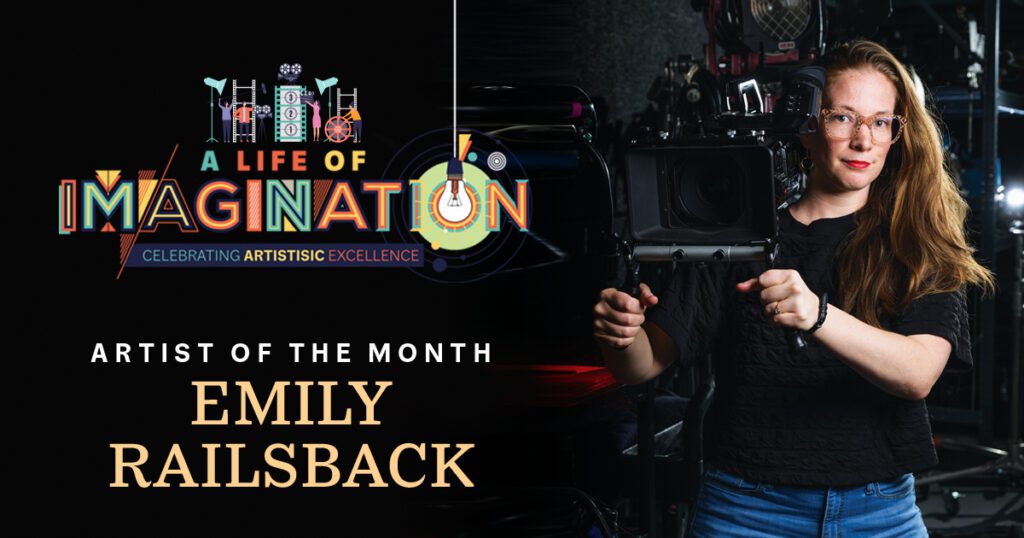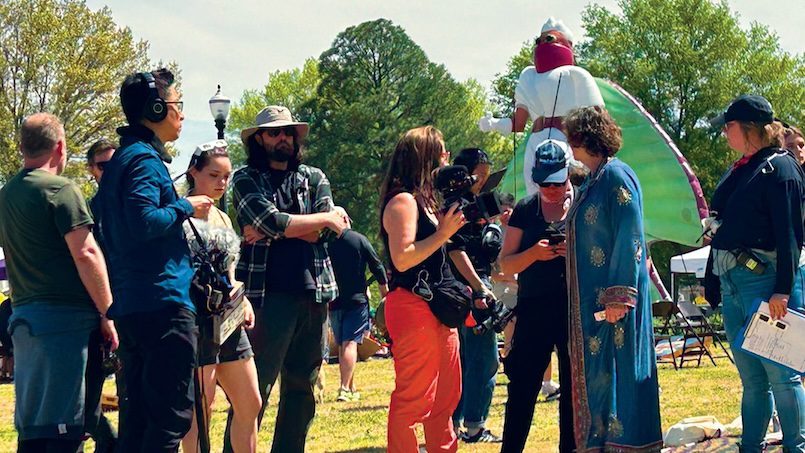30 Apr 2024 501Der Women 2024: Artist of the Month – Emily Railsback
By Donna Lampkin Stephens
As an undergraduate, Emily Railsback was interested in so many things that she had a hard time choosing a major. Little did she know, though, that her exploration was preparing her for a career as a filmmaker.

Railsback, assistant professor of film at the University of Central Arkansas, is the driving force behind Burnt Sugar Productions, which “creates rural women films that connect culture to place, highlight the environment, and employ primarily female crews in the midwest and south,” according to emilyrailsback.com.
Burnt Sugar’s latest project, “Roadtrip to the Totality Zone,” is an absurdist comedy, one scene of which was recently shot during Dog Barkanalia, UCA’s pet-friendly eclipse party.
Inspired by Dr. Gayle Seymour and UCA’s Barkanalia Committee, which had worked to plan the event since the fall of 2022, Railsback said the film would showcase Arkansas and how the eclipse would change Kitty, the main character, a retired actress who never made it big but found success performing at fancy dog parties. She believes she is destined to die during the eclipse, so she road trips through Arkansas to find her poodle a new owner and meets a burned-out documentarian who captures her journey with real Arkansans.
Railsback is writer, director and producer. Tara Sheffer, an award-winning filmmaker and native Arkansan, is the main producer. After the eight-day April shoot, Railsback will spend the next six months editing and then submitting the film to festivals in hopes of a 2025 distribution. She said the likely first market would be Cannes in May 2025 or the American film market in November 2025.

She couldn’t have known then that her wandering mind during her two years at Whitworth University would lead her here. “I love learning, and I love finding new subjects,” Railsback said. “I want to do a lot of things. Everything I was studying makes up film — English, theater, cross-cultural studies. Add creative writing and a dance minor, and I ended up with graphic design and international studies with a minor in painting,” which she finished at Tabor College in Hillsboro, Kan.
Born in Los Angeles, Railsback grew up in Colorado and Kansas. After graduation, she taught yoga and then painting before settling in Chicago, where she earned an MFA in Screen Directing at Columbia College Chicago. She then taught as an adjunct and worked as an independent filmmaker for four years.
She started Burnt Sugar Productions in 2015.
“Right after grad school, I was very hungry to make a film,” she said. “I was sort of casually dating my husband (Jeremy Quinn) at the time. He was the wine director for a restaurant in Chicago and sick of the American wine scene. He wanted to go back to live in the Republic of Georgia, which has been making wine in clay pots for 8,000 years.”
She said 525 varieties of grapes originated there, many of which were ripped out during Soviet rule. “But they’re growing in people’s backyards. Jeremy wanted to walk on foot across the country and taste wine in different people’s gardens.”
She thought that idea would make a great film, so she quit her internship at a film company. But the president of the company owned a winery and wanted to talk to her about the project. He ended up paying for the film.
“Easiest funding ever,” she remembered, laughing. “I was 27.”
She and Quinn moved to Tbilisi, resulting in their eventual marriage and the 2018 feature documentary “Our Blood is Wine,” which premiered at the Berlinale International Film Festival. Other Burnt Sugar films include “Fear Not” (2020), “American Parent” (2023) and “The Game Camera” (2024). Railsback has also directed more than 10 short films.
Her style blends narrative with cinema-vérité techniques. “That feels truthful,” she said. “I’ve done that on multiple projects. My first film with Jeremy was a documentary, but the next one was narrative. I think my heart is really blending the two.”

The COVID-19 lockdown marked a turning point for the Chicago couple when they had a daughter. “My husband was a sommelier, and restaurants were closing down; I was doing freelance work. So we had no health care (insurance) and we thought, ‘We need a real job,’” she recalled. “During that time is when I applied for teaching positions at different schools, and UCA was so perfect. I feel like the job posting was perfect for my skills.”
In 2017, she and Quinn attended the 2017 solar eclipse in Illinois, planting the seed for her latest film.
“Carbondale was at the center of everything, and it was nuts,” she remembered. “Chicago was out of eclipse glasses; you couldn’t buy them on Amazon. There was so much traffic, the five-hour trip to Carbondale took 11 or 12 hours. We ended up going to campgrounds, but there were no extra spots, and we had a tent, so we just set up our tent at one place 20 miles away from Carbondale.
“On the road trip there, tensions were high. Jeremy really didn’t want to go, and I really did want to go. There’s so much conflict that is ripe for this setting. But it was just a magical experience. Once we got there, there was a kid on a bicycle giving out glasses for free.
“When you experience a total eclipse with people, life doesn’t matter the way we thought it did.”
With Conway in the path of totality for 2024, the topic was perfect for her next film. “As an independent filmmaker, if you don’t have a lot of money, you have to figure out how to make a movie where you are,” she said.
So she did.
- 501Der Women 2024: Artist of the Month – Emily Railsback - April 30, 2024
- Ryan Lajeunesse found a calling that makes a difference on and off the field - March 10, 2024
- Packaged with care - February 1, 2024











